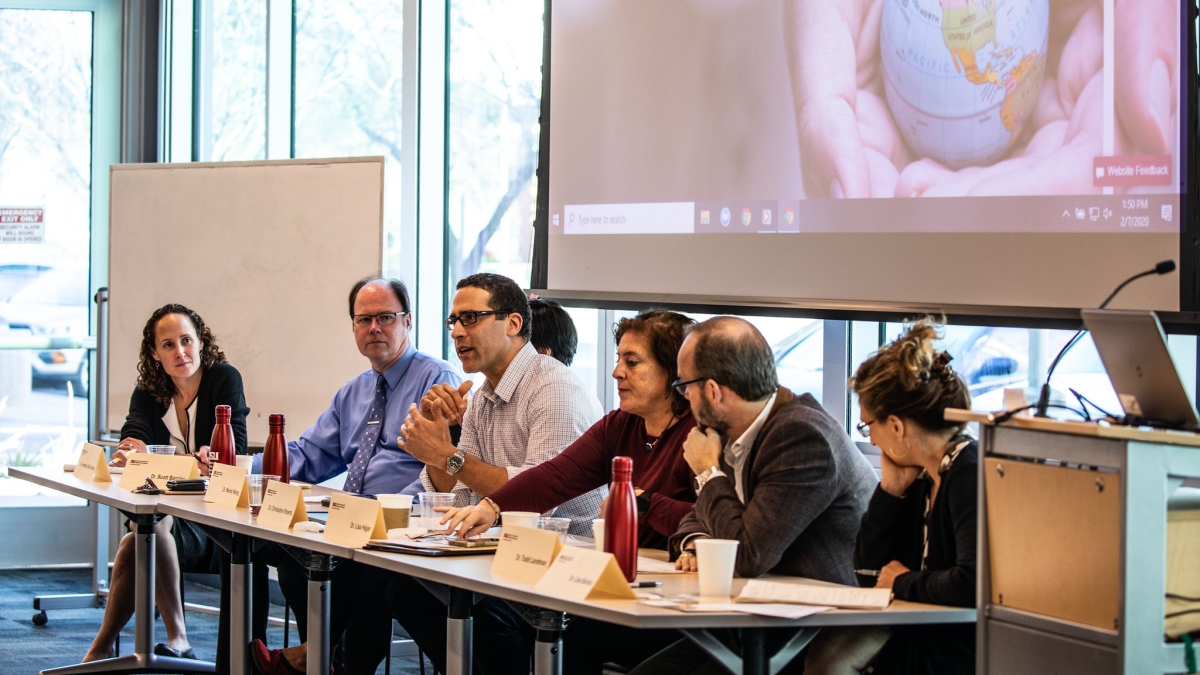ASU to host conference on future of international human rights law

The Global Human Rights Hub convenes for the 2019 Visioning event, part one of the two-part conference series "Human Rights on the Edge."
To cap off its first year as a hub for human rights scholars at Arizona State University, the Global Human Rights Hub will host a virtual global conference, "Human Rights on the Edge: The Future of International Human Rights Law and Practice" April 29–30.
Housed in the School of Social and Behavioral Sciences on ASU’s West campus, the Global Human Rights Hub was awarded a National Science Foundation conference grant in August 2020 from the NSF’s Law and Science section to hold this event.
The virtual conference will convene 40 human rights scholars from around the world to address a new set of challenges that threaten the future of international human rights law. These challenges include the resurgence of populist governments in both the global north and south, forcing scholars to rethink the past and future of this legal regime.
Liberal democracies from the United States to India are clamping down on the rights of non-citizens, Indigenous, and minoritized people, rolling back rights for women, girls and LGBTQ people, and instituting policies at odds with both the spirit and the letter of international human rights law. Escalating demands for economic justice and political reform pervade wealthy industrialized nations as well as developing ones, and authoritarian regimes are as likely as liberal democracies to invoke human rights claims. Many Western scholars are increasingly pessimistic about the future of international human rights law, suggesting that its shaky foundations make it a poor mechanism for the promotion of rights or that it is simply ineffective in improving human rights practices.
Yet, despite this pervasive cynicism about the role of governments and the United Nations in protecting and promoting human rights, mass movements and civil society organizations that stake demands in the language and law of human rights proliferate globally. Subnational governments, nongovernmental actors and ordinary citizens have also taken up human rights frameworks and action when the national level of government has fallen short.
Conference participants will grapple with questions about the future of international human rights law. Will the body of international human rights law that has developed over the last 70 years collapse amidst these new challenges? Will these international legal rules persist but transform? How are local, national and global dynamics intersecting in new ways to potentially reshape human rights law and practice?
ASU’s Global Human Rights Hub is committed to mentoring and nurturing the next generation of interdisciplinary human rights scholars. The upcoming NSF conference includes established and junior scholars from political science, sociology, criminology, law and anthropology. Graduate students, postdoctoral scholars and assistant faculty will serve as chairs and discussants, giving them the opportunity to critique the work of their senior colleagues. A mentoring panel will conclude the conference events, featuring distinguished human rights faculty who will reflect on their work and answer questions from junior colleagues.
At the core of the hub’s programming for the ASU community are four thematic working groups in the areas of gender, international law, migration and trafficking. The groups are composed of ASU faculty, graduate students and postdoctoral scholars. The working groups meet virtually a few times each semester and provide a forum for members to workshop their work in progress and collaborate on grants. The working groups are run by pairs of junior and senior scholars, who also make up the hub executive committee.
The hub is directed by Heather Smith-Cannoy, associate professor of political science/social justice and human rights. Executive committee members include: Magda Hinojosa, professor of political science; Tricia Redeker-Hepner, associate professor of anthropology; Kendall Funk, assistant professor of political science; Audrey Comstock, assistant professor of political science; and Malay Firoz, assistant professor of anthropology.
For more information on the working group meetings visit the hub website.
Beyond the working groups, the hub executive committee initiated the Hub Graduate Fellows Program, a competitive process that invites applications from graduate students in any discipline on any ASU campus whose work touches on human rights. This year, five fellows were selected from across ASU. Fellows are paired with a faculty mentor from the executive committee and meet regularly with each other and hub faculty to workshop blog posts that they write based on their human rights research.
Fellows are also invited to join working groups and take part in talks and other hub events. Visit the Hub Graduate Fellows blog.
In its first year, the hub has become a lively virtual space for those that are passionate about human rights and social justice. In addition to the working group meetings, conferences and graduate fellows program, the hub has also sponsored and co-sponsored talks from Sarah Holewinski, the Washington director at Human Rights Watch, David Scheffer, former ambassador-at-large for war crimes and others. The Global Human Rights Hub is committed to creating a space for those engaged in human rights research to network, collaborate and nurture emerging human rights scholars.
More Arts, humanities and education

2 ASU professors, alumnus named 2025 Guggenheim Fellows
Two Arizona State University professors and a university alumnus have been named 2025 Guggenheim Fellows.Regents Professor Sir…

No argument: ASU-led project improves high school students' writing skills
Students in the freshman English class at Phoenix Trevor G. Browne High School often pop the question to teacher Rocio Rivas.No,…

ASU instructor’s debut novel becomes a bestseller on Amazon
Desiree Prieto Groft’s newly released novel "Girl, Unemployed" focuses on women and work — a subject close to Groft’s heart.“I…

